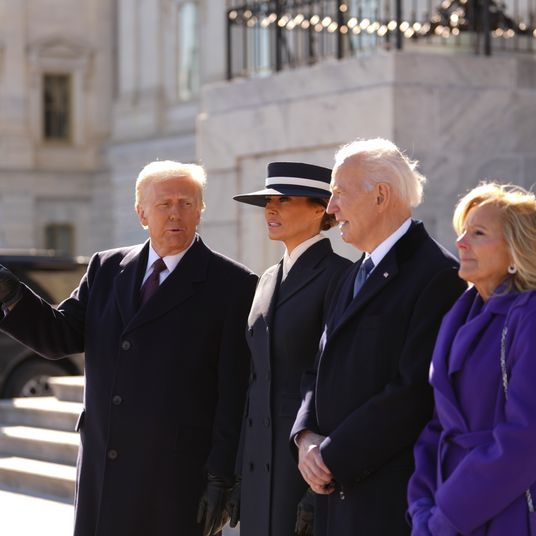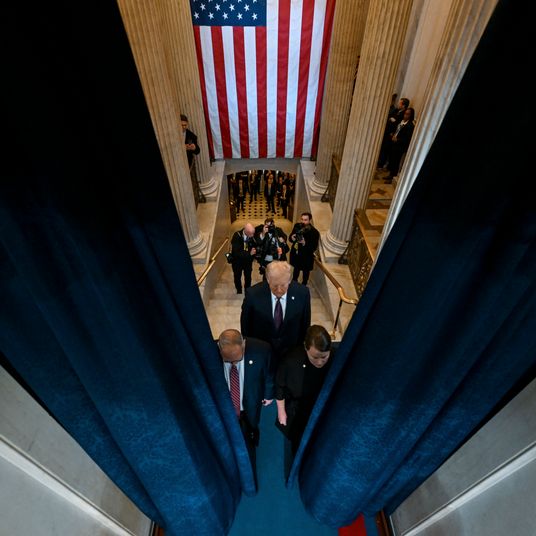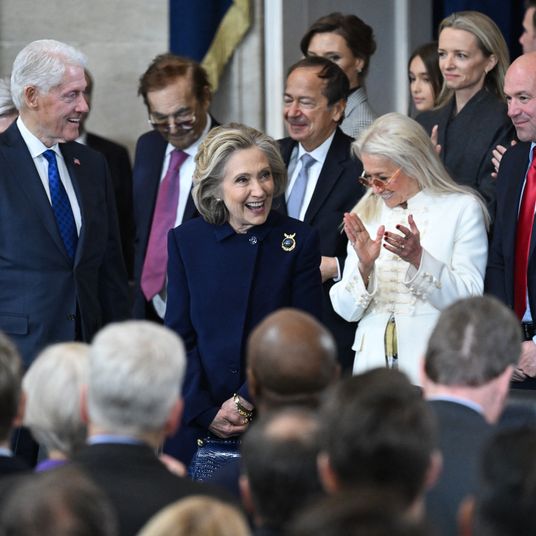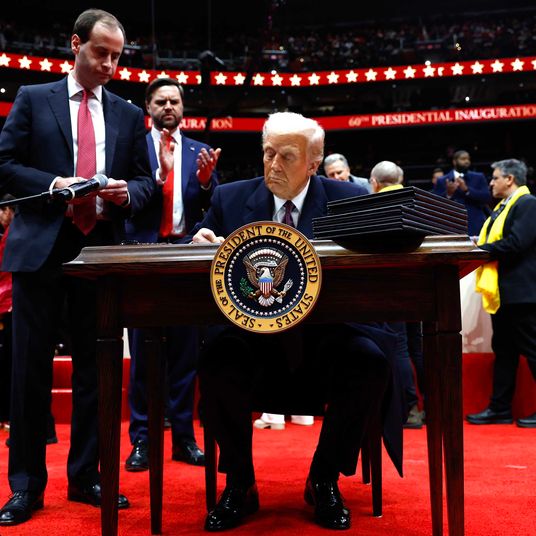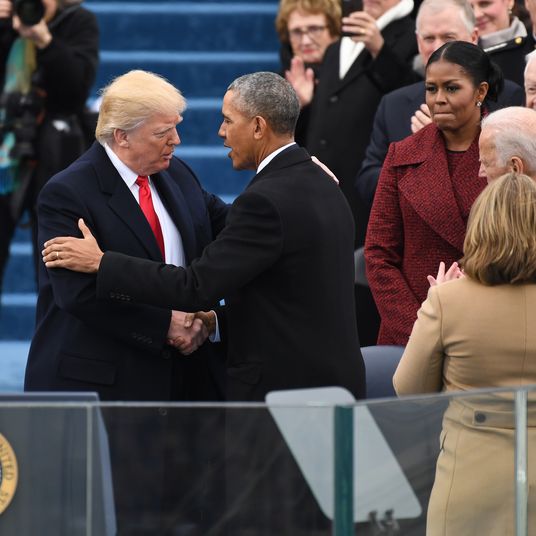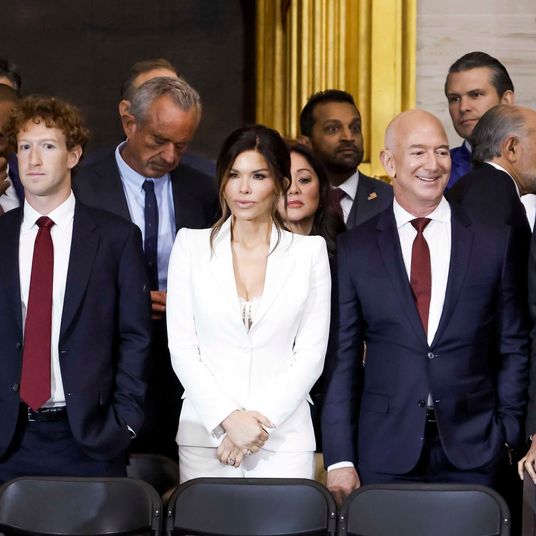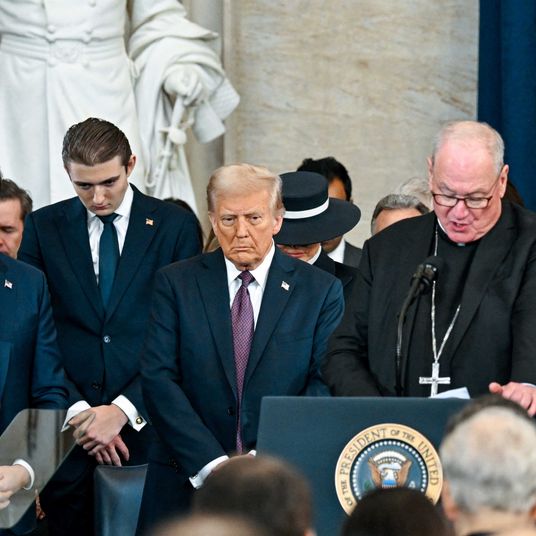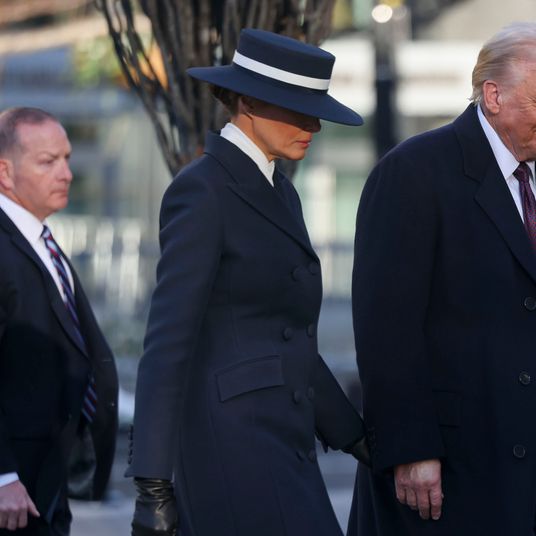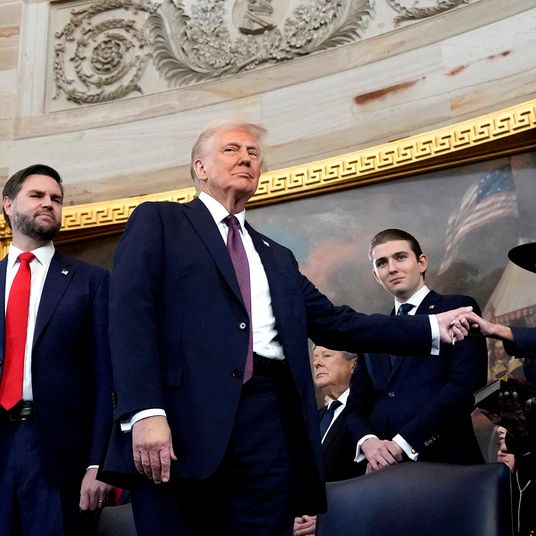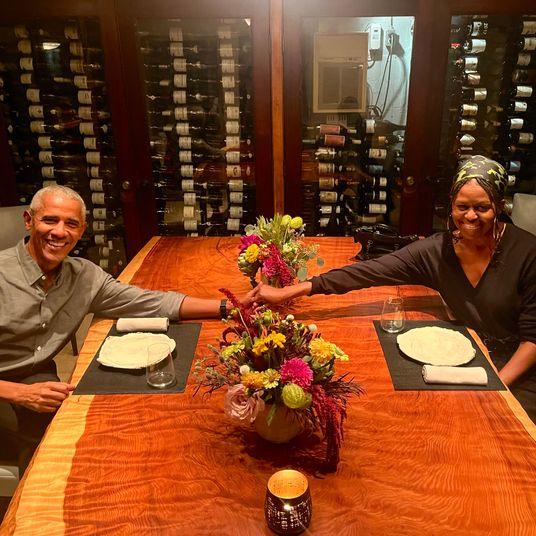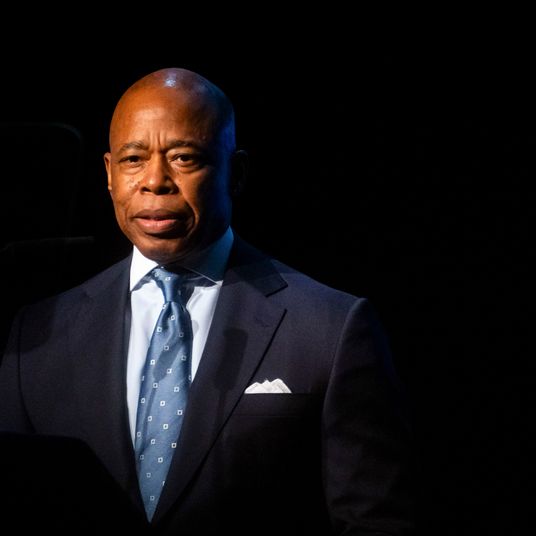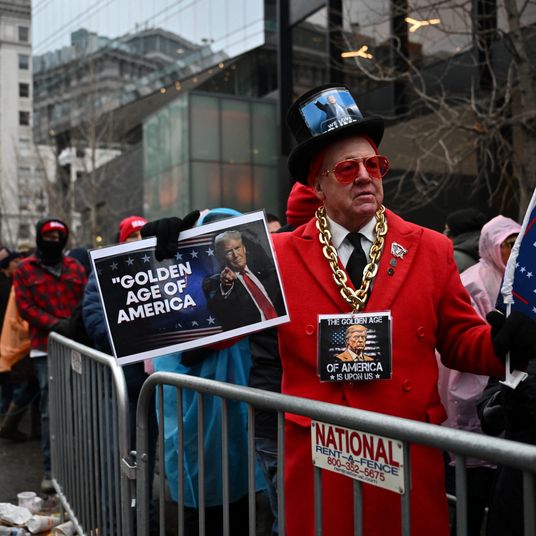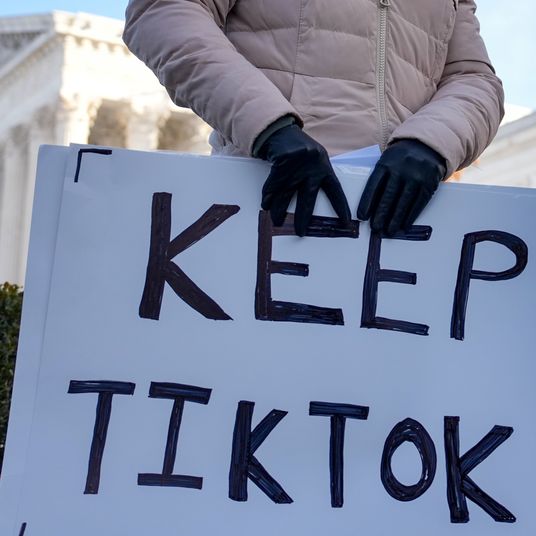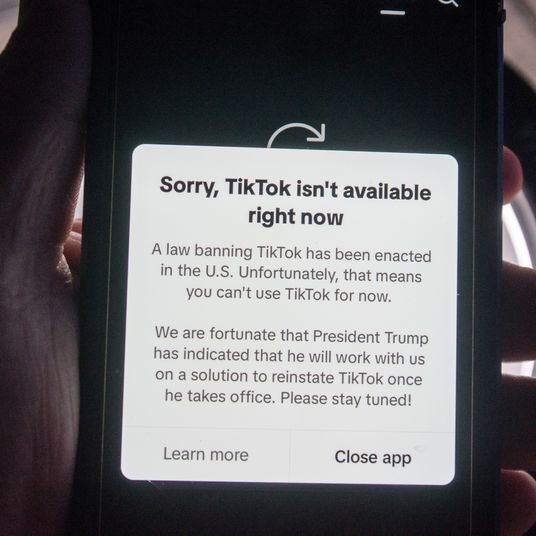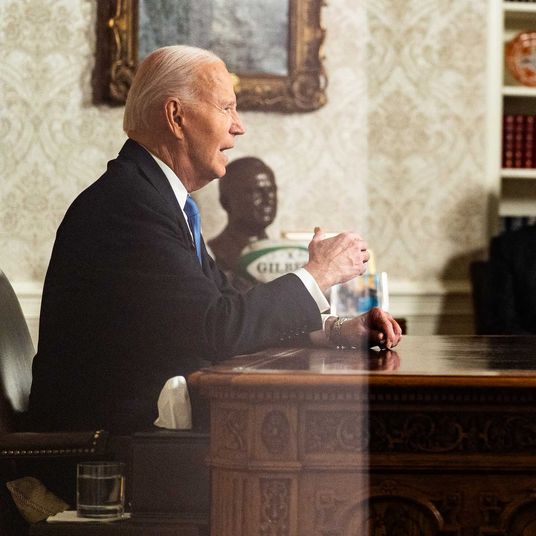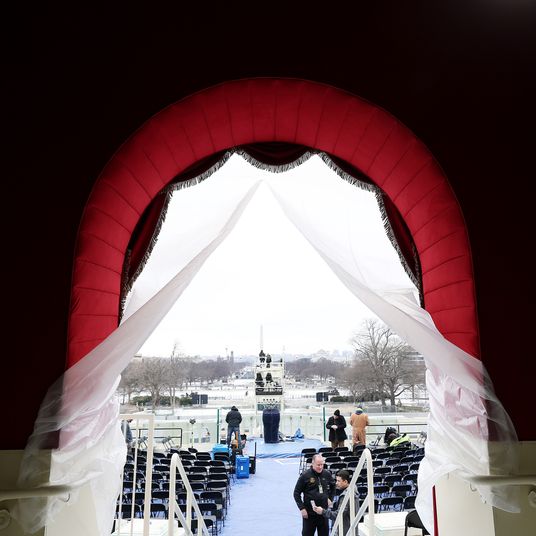
Photo: Getty Images
Someone reading the text of the remarks delivered by Hillary Clinton last night in Indianapolis might get the impression he was perusing a victory speech. Certainly, the first words on the page come across as triumphal: “Not too long ago, my opponent made a prediction. He said I would probably win Pennsylvania, he would win North Carolina, and Indiana would be the tie-breaker. Well, tonight we’ve come from behind, we’ve broken the tie, and thanks to you, it’s full speed on to the White House.”
But to those of us who witnessed Clinton’s performance live at the Murat Center in downtown Indy, the candidate seemed less exultant than deflated, as if the air had been let out of her. She spoke in muted, measured tones very much unlike the rousing timbre she’d projected after her victories in Pennsylvania, Ohio, and Texas. Her husband, standing right behind her, often looked downright morose. Her supporters in the room, picking up the vibe, cheered wanly and with decreasing frequency as the speech went on. All in all, it was a moment that smacked of the end of something — and with good reason, I’d venture.
For Hillary, the primaries in Indiana and North Carolina appeared to be her last best chance to jolt the race — to pick up ground on Barack Obama and bolster her argument to the superdelegates that her rival was a declining asset. And in the days since Pennsylvania, expectations had been soaring in Clintonland that she was poised to do all of that and maybe more. Clinton’s lead in Indiana seemed comfortable. She seemed to be gaining on Obama in North Carolina, a state he’d long been expected to win in a canter because of its large populations of African-Americans and college students. And the hopemonger looked tired, rattled, and on the defensive over his string of big-state losses and the continuing conniptions over his knuckle/chuckleheaded former pastor, Reverend Jeremiah Wright.
But, in the end, no jolt was forthcoming. Instead, Obama walloped Clinton by fourteen points in North Carolina. And after a late surge that kept us all up way past our bedtimes waiting on results from Lake County, Indiana — and introduced us to the mayor of Gary, a gentleman named Rudy Clay whose performance last night demonstrated unequivocally that there is at least one other career available for clowns besides the circus — Obama fell short of beating HRC in the Hoosier State by the barest of margins.
Beyond the eradication of any momentum that had lately accrued to Clinton, the effect of Obama’s showing was threefold. First, it handed at least five more pledged delegates to the him, enhancing his already formidable lead in that department. Second, the shellacking he administered in North Carolina erased the roughly 200,000 popular-vote gain scored by Clinton in Pennsylvania — thus making it all but inevitable that she will fail to catch him in that category, even in the unlikely event that Florida and Michigan are counted. And third, it undermined significantly the notion that Obama is irreparably damaged goods, a candidate too elitist, too secular, and maybe just too black to be elected in the fall. Indeed, though the exit polls contained some good news for her, there were an equal number of reassuring signs to which he and his people can point.
To wit: While Clinton whupped Obama among non-college-educated white voters in both states as usual, Obama held his own with lower-income voters overall. Among voters who said the economy was the issue they cared most about — voters whom Clinton carried overwhelmingly in Pennsylvania and Ohio — he ran just two points behind her in Indiana and eight points ahead of her in North Carolina. He beat her in both places among those who attend church weekly or more than weekly. And even after being portrayed for weeks as if Reverend Wright were his running mate, Obama won 37 percent of the white vote in North Carolina and fully 40 percent in Indiana. Not too shabby, considering.
Given all this, it’s hardly surprising that the media consensus is that, for all intents and purposes, Obama is now the Democratic nominee. (Both Tim Russert and Matt Drudge had flatly declared this to be the case by close of business last night.) Throughout this campaign, of course, almost every media consensus that’s emerged has quickly been blown to pieces. But this time, I suspect, barring some catastrophic Obama implosion — photographic evidence of a ménage à trois featuring the candidate, Wright, and Bill Ayers, perhaps? — the consensus will prove correct.
The question now is when and how Clinton will leave the race. Those seeking affirmation that she and her people understand that it is over are grasping at thin straws: the fact that she canceled her appearances on the morning shows today; that the fundraising e-mail her campaign dispatched last night did not contain an actual solicitation for, er, funds. Those who fear that she will pursue a scorched-earth campaign to the bitter end, on the other hand, will note that she is heading to West Virginia today and South Dakota tomorrow — both sites of upcoming contests.
And, who knows, maybe she is completely deluded. Maybe she still thinks she can win. But whatever else can be said of Hillary Clinton, she is no fool. What my gut tells me is that although she may not quit until June, everything that happens from this point on is sheer choreography, the orchestration of her exit — on her terms. Her good-bye may be long or it may be short, but a good-bye it will be. She hasn’t left the building yet, but we soon may see her taking up residence in the departure lounge. —John Heilemann
Related: How the Gas-Tax Pander Brought Clinton Low
What Every Last Pundit Is Saying About Clinton
For a complete and regularly updated guide to presidential candidates Hillary Clinton, Barack Obama, and John McCain — from First Love to Most Embarrassing Gaffe — read the 2008 Electopedia.





